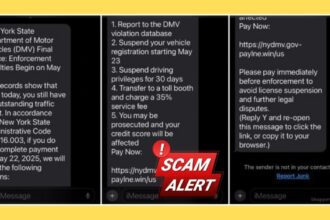Fraudsters use fake job offers to lure victims into cryptocurrency schemes that have cost some individuals thousands of dollars
In recent weeks, a sophisticated scam operation has been targeting job seekers with promises of lucrative software engineering positions at a company called “Digital Crate” or simply “Crate.” What begins as an appealing career opportunity quickly transforms into a cryptocurrency trap that has already claimed numerous victims across online platforms. The latest iteration involves messages from someone identifying as “Jacob” using the email address [email protected], claiming to represent “crate app careers recruitment.”
This scheme is part of a growing trend of fraudulent job offers designed to exploit vulnerable job seekers, particularly those in the technology sector. By understanding how these scams operate, individuals can better protect themselves from falling victim to these increasingly convincing schemes.
Overview of the Digital Crate App Careers Recruitment Scam Text
The Digital Crate App Careers scam follows a carefully designed pattern that has proven effective at bypassing many people’s initial suspicions. The operation begins with unsolicited messages through various platforms, including direct messages on professional networking sites, emails, or even text messages.
The process typically unfolds in several stages:
- Initial Contact: Victims receive a message about a software engineering position at “Digital Crate” or “crate app” with promises of competitive salaries, remote work flexibility, and growth opportunities.
- Trust Building: The scammers create legitimacy by using professional language, company logos, and websites that appear authentic. They may conduct initial “interviews” via messaging platforms or calls that seem legitimate.
- Transition to “Training”: After preliminary discussions, victims are told they must complete a “training” or “evaluation” period where they’ll perform simple tasks to demonstrate their abilities.
- Cryptocurrency Introduction: The victim is instructed to download specific cryptocurrency apps and create accounts, ostensibly for “payment processing” or “company projects.”
- Initial Rewards: In the early stages, victims actually receive small payments (typically $70-200) that can be withdrawn, building trust in the system.
- The Trap: Around the fifth day of engagement, victims are introduced to “combination tasks” or other scenarios that require them to deposit their own funds ($2,000+) to “unlock” bigger rewards or continue with the process.
- Escalating Demands: Once the victim makes an initial deposit, they face increasingly larger financial requirements, with promises that all funds will be returned plus substantial bonuses.
Former victims report losing anywhere from $1,700 to $30,000 through these schemes, with virtually no chance of recovery.
Text Message and Communication Patterns
The scammers behind the Digital Crate scheme employ specific communication strategies designed to appear professional while gradually leading victims toward financial loss. Recognizing these patterns can help potential victims identify the scam before it’s too late.
Common Contact Methods:
- Direct Messages: Unsolicited outreach on LinkedIn, Twitter, or other professional platforms
- Text Messages: Messages claiming to be from HR departments or recruiters
- Emails: Messages from domains that appear legitimate (like getcrate.app)
- WhatsApp Groups: Addition to professional-looking groups with apparent “colleagues”
Communication Red Flags:
- Messages that begin with generic greetings without specific details about where they found your profile
- Recruiters who are eager to move conversations to WhatsApp or Telegram
- Discussion of cryptocurrency or blockchain early in the recruitment process
- Job descriptions that are vague but promise exceptional compensation
- Pressure to make quick decisions about joining the team
One victim shared their experience: “The recruiter seemed so legitimate. They knew industry terms, asked reasonable technical questions, and even had me complete a simple coding exercise. It wasn’t until they started talking about their ‘proprietary payment system’ that I began to get suspicious.”
Is Any “Crate App” Software Engineering Position Text Legit or Scam?
Research into “Digital Crate,” “Crate App Careers,” Getcrate App Recruitment”, or similar variations reveals concerning information. There is no established, legitimate technology company operating under these specific names with the recruiting patterns described by victims. While there are legitimate companies with “Crate” in their names across various industries, the specific recruitment operation targeting software engineers through unsolicited messages appears to be fraudulent.
Legitimate technology companies typically:
- Recruit through established channels like official company career pages
- Have verifiable corporate histories and leadership teams
- Maintain consistent branding across platforms
- Follow standard industry hiring practices, including formal interviews
- Never require candidates to pay money or invest cryptocurrency as part of the hiring process
If you’ve been contacted about a position at “Digital Crate” or “Crate App” through unsolicited messages, exercise extreme caution and conduct thorough research before engaging further.
Warning Signs of Job Offer Scams
Beyond the specific “Digital Crate” operation, job seekers should be aware of universal red flags that suggest a job offer may be fraudulent:
Immediate Red Flags:
- Too-good-to-be-true compensation: Salaries significantly above market rates with minimal requirements
- Pressure tactics: Urgency to accept positions or complete certain steps quickly
- Poor communication quality: Despite claiming to be a professional organization, messages contain grammatical errors or unusual phrasing
- Personal financial information: Requests for bank details, credit card information, or identification documents early in the process
- Upfront payments: Any requirement to pay for training, equipment, or software before beginning work
- Cryptocurrency involvement: Legitimate employers rarely involve cryptocurrency in the hiring or payment process
Contextual Warning Signs:
- Job offers received without having applied
- Interviews conducted entirely via text or messaging apps
- Company websites that were recently created or lack substantial content
- Inability to verify the recruiter’s identity through official company channels
- Domain names that slightly modify legitimate company names
“The sophistication of these scams has increased dramatically,” notes cybersecurity expert Marcus Thompson. “They’re researching their targets, creating convincing web presences, and exploiting the legitimate desire for remote work opportunities that has expanded since the pandemic.”
The Cryptocurrency Connection of Fake Digital Crate App
The Digital Crate scam and similar operations have increasingly incorporated cryptocurrency elements, creating a particularly dangerous combination for victims. Understanding this connection helps explain why these scams are both profitable for criminals and difficult for victims to recover from.
The cryptocurrency aspects typically include:
- Task-Based Earning: Victims are told they can earn cryptocurrency by completing simple tasks like reviewing apps or clicking links, which initially seems legitimate.
- Small Verified Withdrawals: To build trust, scammers allow victims to withdraw small amounts of cryptocurrency, proving the system “works.”
- Combination Tasks: Eventually, victims encounter “combination tasks” requiring personal deposits that exceed their account balance.
- Irreversible Transactions: Once cryptocurrency is transferred to scammers’ wallets, transactions cannot be reversed, unlike credit card charges or bank transfers.
- Regulatory Gaps: The international and somewhat unregulated nature of cryptocurrency makes it difficult for authorities to track and prosecute perpetrators.
One victim explained: “After I’d successfully withdrawn about $200 over three days, I was completely convinced it was legitimate. When they told me I needed to deposit $2,100 for a ‘combination task,’ it seemed reasonable given the profits I’d already seen. That money disappeared instantly, and then they wanted another $2,400 to ‘unlock’ my funds.”
Protecting Yourself From Recruitment Scams
While these scams are increasingly sophisticated, there are concrete steps job seekers can take to protect themselves:
Verification Steps:
- Research thoroughly: Check company registration, business records, and online presence beyond what the recruiter provides
- Contact directly: Reach out to companies through their official websites rather than responding to unsolicited messages
- Cross-reference employees: Look up supposed recruiters on LinkedIn and verify their employment history
- Check domains: Verify how long company domains have been registered using WHOIS lookups
- Seek official channels: Legitimate job openings are typically posted on company career pages and established job boards
Protective Practices:
- Never send money or cryptocurrency to secure a job opportunity
- Be skeptical of jobs that require minimal qualifications but offer exceptional pay
- Use video calls to verify the identity of recruiters when possible
- Trust your instincts if something feels unusual or pressured
- Report suspicious job offers to relevant platforms and authorities
“Job seekers should remember that legitimate employers pay you, not the other way around,” advises career consultant Jennifer Morales. “Any ‘opportunity’ that requires you to send money, cryptocurrency, or purchase specific equipment should be approached with extreme caution.”
Frequently Asked Questions
1. Is the Get Crate App Careers Job Offer Text Legitimate or Scam?
No, job offers from “Get Crate App Recruitment,” “Digital Crate Careers,” or similar variations sent via unsolicited text messages, emails (including from [email protected]), or direct messages are not legitimate. These are confirmed scam operations designed to ultimately separate victims from their money through cryptocurrency “tasks.” Legitimate technology companies do not recruit through unsolicited messages promising high salaries for vague roles, nor do they require cryptocurrency involvement in their hiring processes.
2. What Should I Do If I’ve Already Responded to a Crate App Recruitment Message?
If you’ve already engaged with these scammers but haven’t sent any money or cryptocurrency:
- Cease all communication immediately
- Do not click on any links they’ve sent
- Block the contact across all platforms
- Report the interaction to the platform where you were contacted
- Monitor your accounts for any suspicious activity
If you’ve already sent cryptocurrency or money:
- Document all communications and transactions
- Report the incident to local law enforcement
- File reports with the FBI’s Internet Crime Complaint Center (IC3) and the FTC
- Accept that cryptocurrency transactions are typically irreversible, but reporting helps authorities track patterns
3. How Do These Scammers Get My Contact Information?
These scammers typically obtain contact information through:
- Data breaches from legitimate job sites
- Information scraped from professional networking platforms
- Purchasing leads from third-party data brokers
- Compromised recruitment databases
- Public résumés and profiles on job boards
They often target individuals who have recently updated their professional profiles or indicated they’re open to new opportunities, making their approaches seem timely and relevant.
4. Why Do These Scams Include Initial Real Payments?
The small initial payments ($70-200) that victims can actually withdraw serve multiple purposes:
- Building trust in the system and overcoming initial skepticism
- Creating a sense of legitimacy that makes larger deposits seem reasonable
- Establishing a psychological pattern of reciprocity and commitment
- Enabling scammers to point to “proof” that the system works
- Making victims more likely to recruit others, expanding the scam’s reach
These small payments are considered “investment costs” by scammers, who know they’ll recoup this money many times over when victims make larger deposits.
5. How Can I Verify If a Tech Company Is Legitimate?
To verify a technology company’s legitimacy before engaging with recruiters:
- Search for the company on business registration databases (e.g., SEC filings for public companies)
- Check the company’s domain age using WHOIS lookup tools (legitimate companies typically have domains registered for years)
- Look for consistent company information across multiple platforms and sources
- Search for employee profiles on professional networks (legitimate companies have multiple employees with consistent work histories)
- Check for physical addresses and verify them using mapping services
- Look for product reviews, user testimonials, and media coverage from established publications
- Contact the company through their official website’s contact information rather than through the recruiter’s provided details
If a company has minimal online presence, no verifiable physical location, few or no confirmed employees, or was established very recently, proceed with extreme caution.
Resources for Victims and Prevention
If you’ve encountered the Digital Crate scam or similar operations, resources are available:
Reporting Options:
- Federal Trade Commission (FTC): ReportFraud.ftc.gov
- FBI’s Internet Crime Complaint Center (IC3): IC3.gov
- Local law enforcement agencies
- Relevant platforms where contact occurred (LinkedIn, Twitter, etc.)
Prevention Resources:
- FTC’s Job Scam Information Center
- Better Business Bureau Scam Tracker
- Career services at educational institutions
- Industry-specific forums and communities
While recovery of lost funds is unfortunately rare in cryptocurrency scams, reporting these operations helps authorities build cases against perpetrators and potentially prevent future victims from falling prey to the same schemes.
As remote work opportunities continue to expand, job seekers must remain vigilant against increasingly sophisticated scams. The Digital Crate operation represents just one variation of a growing threat targeting professionals across industries. By understanding the warning signs and implementing protective measures, individuals can better navigate the job market while avoiding costly and devastating scams.






































